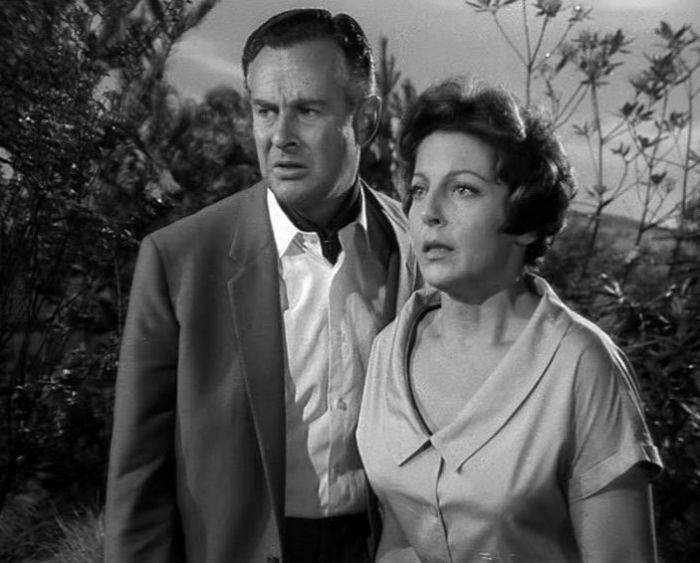
Following a car accident, Brady’s invisible state becomes public knowledge. Whilst he struggles to adjust to his new-found fame, one of Sally’s friends, Linda Norton (Margaret Court) approaches him with a strange story. She claims that her stepfather and his sister are planning to kill her mother ….
Picnic with Death rehashes some material from the unaired pilot concerning Brady’s emergence as a public figure. The reason for not keeping his invisible identity secret any longer is obvious in one way, since it widens the range of stories he can become involved in (as here, with Linda turning to him for help).
John Norton (Derek Bond) and his sister Carol (Faith Brook) are deeply attached to their family home, Foxgrange. John’s wife, Janet (Maureen Prior), is a woman of independent means and John is hopeful that she’ll continue to pour more money into Foxgrange’s upkeep. She refuses, as she can see there would never be enough money available to maintain it for any length of time. Her refusal – and by this time we’re about half-way through the story – does seem to bear out Linda’s story, as John exits in a threatening manner. But with Brady dismissing the tale as little more than adolescent jealousy, it falls to Sally to turn detective.
Margaret Court is remarkably squeaky and rather highly-strung as Linda, so it’s possibly not surprising that Brady dismisses her out of hand. Sally’s decision to lurk around the bushes – where she overhears John and Carol plotting to murder Janet – is an unexpected turn of events but it’s nice that Deborah Watling is a little more involved in the story for once.
Derek Bond, the second Hunter (from Callan) to appear in the series, following Michael Goodliffe in Secret Experiment, glowers in a menacing fashion and helps to raise the story a little. Part of the problem is that it’s hard not to believe that Brady will save the day once he’s been convinced that Linda and Sally know what they’re talking about. Still, there’s an amusing cameo from Hammer stalwart Michael Ripper (“Eh Harry, that invisible man. He’s here!”) to sweeten the pill a little.
Of course, Brady turns up in the nick of time to prevent Janet from plummeting to her death over a cliff in a runaway car whilst Diane finds a gun from somewhere to keep John and Carol covered (this is odd, since Diane has never seemed the gun-toting type before). A slightly messy tale then, but as with all the stories it clips along at a decent pace.



